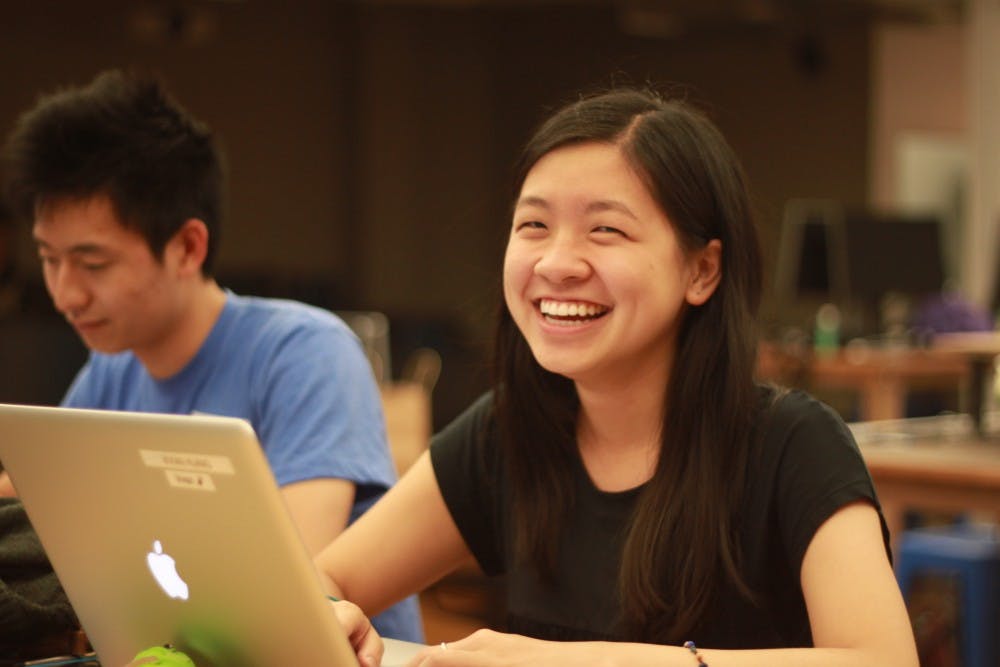Street: So you’re an intern. What do you do?
Vivian Huang: I’m a software engineering intern at Venmo in New York. I’m on the Android team, so I work on the Android peer-to-peer app. (We’re p2p for short.) This is Venmo’s first year having an official intern program—in the past they’d have a few interns here and there. But this year they have…I want to say 10 or 12 engineering interns. Overall we have like 20. It’s a pretty big internship program, especially for a company of Venmo’s size.
Street: So big is Venmo? VH: Honestly, we’re growing every week. Since I’ve started, they’ve hired at least 5 to 10 more people. Maybe…50 people?
Street: That’s pretty small! How did you find out about the internship? VH: I knew about the company just because it’s really widely used on Penn’s campus, so I looked them up and applied online. I talked a little to the co-founder at the Start-up Career Fair, but I had already started the application process.
Street: So you’re in New York… VH: It’s really cool—I love New York. It’s amazing to live here for the summer—I feel like I have a little more freedom, since work is work, but outside of work I don’t have to worry about that much, so I have a lot of time to explore the city. I live reasonably close to work, so I walk to work every day.
Street: Did you feel prepared when you got there? VH: I was incredibly nervous before I started that I wasn’t going to be able to get up to speed on time, or that I’d be behind, or all the other interns would be more experienced and move faster than me…but it’s actually been very nice. I didn’t do any Android before I started—I had never touched it before. But I have an Android phone and I wanted to develop for what I use.
Street: So what are your main responsibilities? VH: We’re working on a redesign of the Android app, so me and the other Android intern have been working on implementing new features for that. We have design interns, so I usually go to them and ask them for advice, since they’re more experienced than I am at user experience, and what looks good and makes more sense. I work on implementing functionality.
Street: How big is your team? VH: It’s me and another intern, and we have the same mentor, the head of the Android team and the only full time Android person when we started. And there’s the intern from the Android team last year. So two full-times and us two interns. We don’t necessarily work on the same projects, but we sit next to each other and talk often and ask each other questions. Or maybe I ask them more questions…
Street: Do you now feel more confident now? VH: I don’t feel…insanely confident, but I definitely feel more confident than when I started. The other intern that I work has done Android development for over a year—he’s actually really helpful.
Street: What’s the office like? VH: It’s pretty open. The office is just one very large room and the desks are mostly floating. There are desks that people usually sit at, but a lot of time people will move around. I don’t really have my own desk—I work at this table in the center. I’ve been sitting there for a few weeks, so I guess it is my desk. People work together all the time, and there’s always someone for me to talk to or ask questions. It’s a good environment for me to work and learn in.
Street: Have you implemented any new features we can check out? VH: One of the features I built in was...a custom calculator and keyboard...The iPhone version had a calculator built in, but the thing with Android phones is that they all look a little different. So [the Android] took the custom keyboard that each phone had and tacked together a little row of operatives above that, which didn’t look as nice or work as smoothly. So I redid that!
Street: What do you do if something isn’t working out when you’re programming? VH: Oh, there have definitely been frustrating times. Sometimes I can pinpoint it, but usually I have to backtrack. I can also look up error logs and see where things are going wrong, and then kind of look in closer at that.
Street: Since there are so many kinds of Android phones, is it a harder system to work on? VH: Oh yeah. For the projects I worked on, I had to test it on lots of different phones. We have lots of old Android phones sitting around the office, so I tested on different versions, different screen sizes, and stuff like that. It’s a little more tedious than just testing it on iPhone 4S, iPhone 4. It’s a lot of testing to make sure that everything works.
Street: Do you think you’ll want to stick with Android programming? VH: I definitely think it’s something I’d do in the future. I’ve really liked it so far. I think it also helps that I have an Android phone, so I guess I’m attached to developing for my own use.
Street: Have you introduced friends and family to Venmo? VH: I got a lot of my friends from high school using it and some of them actually were able to use it with their friends. I’ve definitely tried to introduce my family to it…but I can’t pretend that they’re technical enough to really use it.

